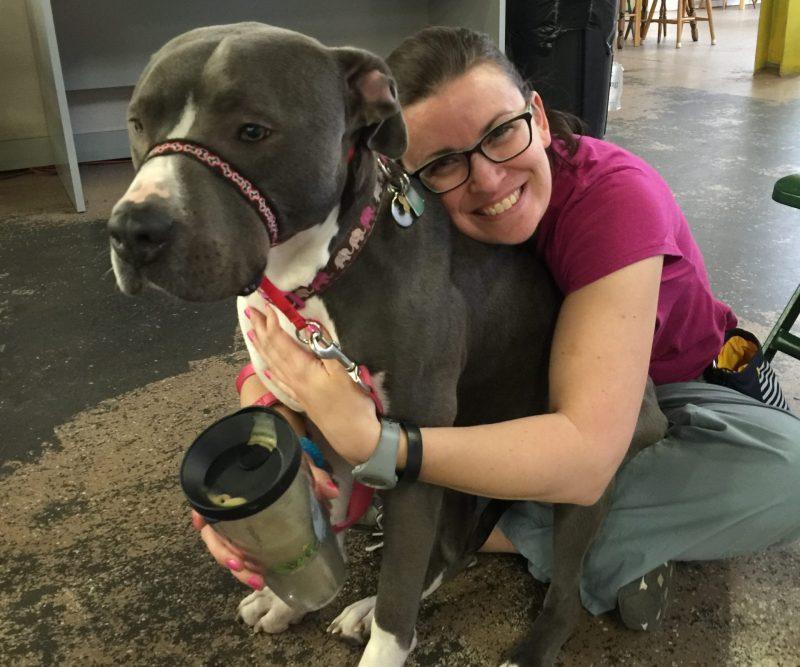-
About
- Leadership & Faculty
- News & Events
-
Admissions
-
Academics
- Graduate
- Advanced Clinical Training
- Continuing Education
- Academic Departments
- Academic Offices
- Simulation Experiences
-
Student Life
- Offices
-
Research
-
- Transformative Research
- Centers & Shared Resources
-
-
Hospitals & Clinics
- Emergency Care
- Hospital Services
-
Community Outreach
- Volunteer
Good Behavior
Behavior veterinary technician Sandra Robbins is all about positive rewards

How many times have you seen a dog who seems "untrained"? Yanking at the leash. Barking aggressively. Jumping non-stop. You might wonder: Who's at fault for this bad behavior? The dog? The owner?
"It's not necessarily either one," says Sandra Robbins, a veterinary technician at Cummings School. "Sometimes it is based on factors present before someone adopted the dog. This can sometimes be from before birth. Many times, we need to adjust our thinking and approach so the patient can be successful."
Robbins joined Cummings School's anesthesia department almost 20 years ago from a private practice. She enjoys academia and teaching-meeting students, interns, and residents, and witnessing their education and growth each year. That theme of positive progress overlaps with her work in behavior training.
Like so many Cummings School community members, Robbins became more interested in behavior after a personal experience. She has always loved training dogs, but her pitbull, Amelia, was a challenge. "She had a lot of anxiety and was fearful of unfamiliar people. It made it tough to take her out to socialize," she says. "I wanted her to be an advocate for her breed, and she was great with people she knew, but those she didn't were scared of her bark and size."
Robbins took Amelia to Cummings School to meet with behavior specialist Stephanie Borns-Weil, D.V.M., DACVB. When she later saw a position for a technician in Borns-Weil's department she "jumped at the chance" to work with her. Over the years, Robbins has stepped back into her anesthetist role when the staff is short but loves being on the behavior team.
Difficult pets can be isolating. The situation can build resentment in families, separate loved ones, and leave owners feeling blame or shame for not doing enough. "Sometimes it's a really unfortunate situation," Robbins says. "Reasons could be either genetics or trauma prior to adoption. It wasn't going to be easy no matter who owned the dog." Every "expert" or uncertified trainer will offer advice. Targeted ads online spread misinformation. And, in the worst cases, pets are put to sleep.
Since 2016, Robbins' role has been to help small animals with behavior issues find a new path.
"One of the things that I like most about our training style and approach is that it's all about positive reinforcement: finding what the animal enjoys most and using that as a reward for the good things they've done. It's about building a bond and common language," she adds. "Imagine you're dropped in a foreign country and you don't know anything about the language; finding somebody that can help you navigate that new world is really helpful. So it's more or less being a translator for the animal, but, beyond that, teaching them and their owner a new language."
Structure is key. Not a militant style, adds Robbins, with commands, but a structure unique to every animal that plays on their strengths for success. Despite working remotely, she says the one-on-one work is rewarding-especially as owners continue to return and work on the training, eventually sending in reports of a successful, bark-free walk down a city block, a calm day alone. A happy meetup with strangers.
"Owning a dog is emotional and can be so challenging," she says. "We want people to know they're not alone."
Do you have a passion for taking care of pets and the people who love them? Are you looking for a collaborative work environment where you can learn, teach, and grow? Cummings School of Veterinary Medicine is hiring Veterinary Technicians for our Foster Hospital for Small Animals at Tufts University and our Large Animal Hospital. Our team of professionals works hard and smiles more. Join us. Learn more and apply.
Department:
Foster Hospital for Small Animals